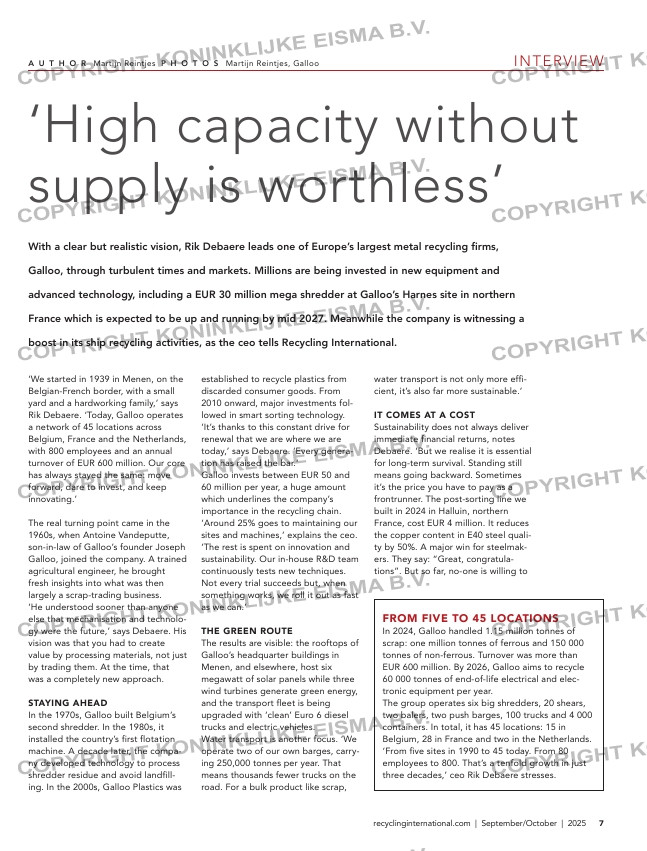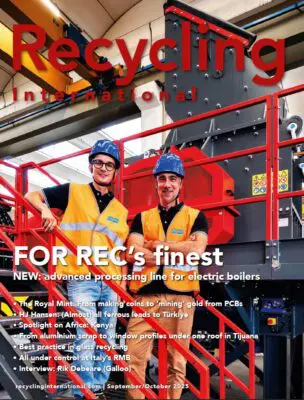Page 7 from: Recycling International September/October 2025

INTERVIEW
7recyclinginternational.com | September/October | 2025
‘High capacity without
supply is worthless’
With a clear but realistic vision, Rik Debaere leads one of Europe’s largest metal recycling firms,
Galloo, through turbulent times and markets. Millions are being invested in new equipment and
advanced technology, including a EUR 30 million mega shredder at Galloo’s Harnes site in northern
France which is expected to be up and running by mid 2027. Meanwhile the company is witnessing a
boost in its ship recycling activities, as the ceo tells Recycling International.
‘We started in 1939 in Menen, on the
Belgian-French border, with a small
yard and a hardworking family,’ says
Rik Debaere. ‘Today, Galloo operates
a network of 45 locations across
Belgium, France and the Netherlands,
with 800 employees and an annual
turnover of EUR 600 million. Our core
has always stayed the same: move
forward, dare to invest, and keep
innovating.’
The real turning point came in the
1960s, when Antoine Vandeputte,
son-in-law of Galloo’s founder Joseph
Galloo, joined the company. A trained
agricultural engineer, he brought
fresh insights into what was then
largely a scrap-trading business.
‘He understood sooner than anyone
else that mechanisation and technolo-
gy were the future,’ says Debaere. His
vision was that you had to create
value by processing materials, not just
by trading them. At the time, that
was a completely new approach.
STAYING AHEAD
In the 1970s, Galloo built Belgium’s
second shredder. In the 1980s, it
installed the country’s first flotation
machine. A decade later, the compa-
ny developed technology to process
shredder residue and avoid landfill-
ing. In the 2000s, Galloo Plastics was
established to recycle plastics from
discarded consumer goods. From
2010 onward, major investments fol-
lowed in smart sorting technology.
‘It’s thanks to this constant drive for
renewal that we are where we are
today,’ says Debaere. ‘Every genera-
tion has raised the bar.’
Galloo invests between EUR 50 and
60 million per year, a huge amount
which underlines the company’s
importance in the recycling chain.
‘Around 25% goes to maintaining our
sites and machines,’ explains the ceo.
‘The rest is spent on innovation and
sustainability. Our in-house R&D team
continuously tests new techniques.
Not every trial succeeds but, when
something works, we roll it out as fast
as we can.’
THE GREEN ROUTE
The results are visible: the rooftops of
Galloo’s headquarter buildings in
Menen, and elsewhere, host six
megawatt of solar panels while three
wind turbines generate green energy,
and the transport fleet is being
upgraded with ‘clean’ Euro 6 diesel
trucks and electric vehicles.
Water transport is another focus. ‘We
operate two of our own barges, carry-
ing 250,000 tonnes per year. That
means thousands fewer trucks on the
road. For a bulk product like scrap,
water transport is not only more effi-
cient, it’s also far more sustainable.’
IT COMES AT A COST
Sustainability does not always deliver
immediate financial returns, notes
Debaere. ‘But we realise it is essential
for long-term survival. Standing still
means going backward. Sometimes
it’s the price you have to pay as a
frontrunner. The post-sorting line we
built in 2024 in Halluin, northern
France, cost EUR 4 million. It reduces
the copper content in E40 steel quali-
ty by 50%. A major win for steelmak-
ers. They say: “Great, congratula-
tions”. But so far, no-one is willing to
Fotobijschrift
KADERKOP
??A U T H O R Martijn Reintjes P H O T O S Martijn Reintjes, Galloo
FROM FIVE TO 45 LOCATIONS
In 2024, Galloo handled 1.15 million tonnes of
scrap: one million tonnes of ferrous and 150 000
tonnes of non-ferrous. Turnover was more than
EUR 600 million. By 2026, Galloo aims to recycle
60 000 tonnes of end-of-life electrical and elec-
tronic equipment per year.
The group operates six big shredders, 20 shears,
two balers, two push barges, 100 trucks and 4 000
containers. In total, it has 45 locations: 15 in
Belgium, 28 in France and two in the Netherlands.
‘From five sites in 1990 to 45 today. From 80
employees to 800. That’s a tenfold growth in just
three decades,’ ceo Rik Debaere stresses.
06-07-08-09_interviewrikdebaere(galloo).indd 7 09-09-2025 08:44



